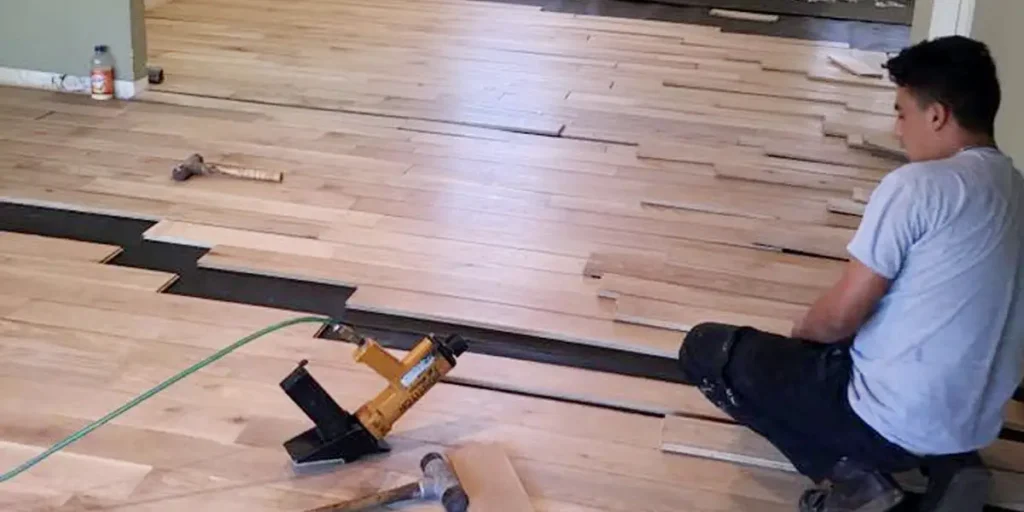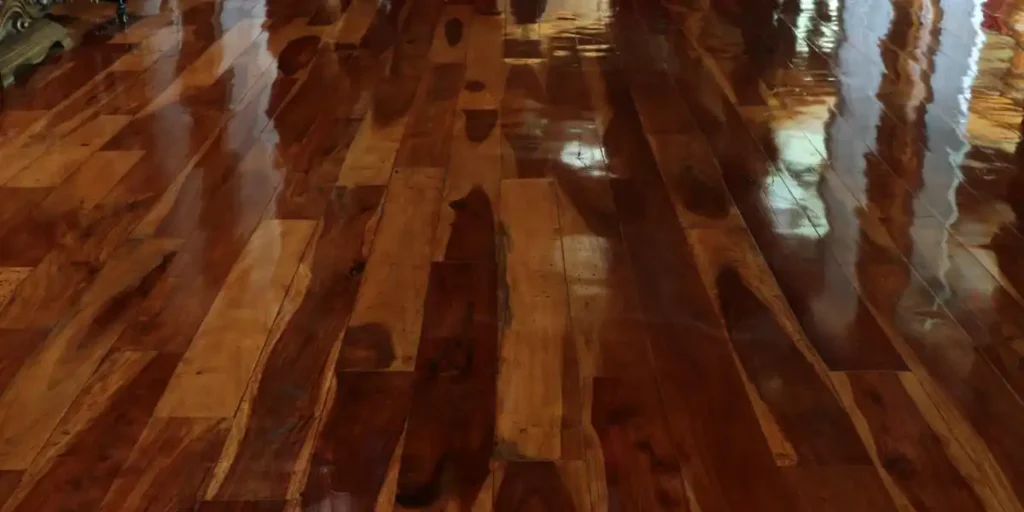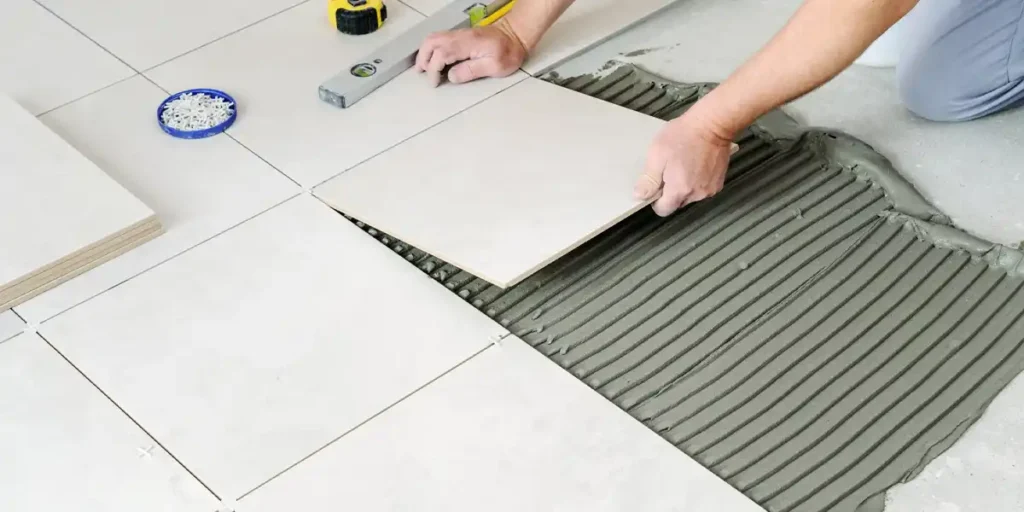Choosing between laminate vs vinyl flooring can be challenging, especially with so many options available. Both are affordable, durable, and stylish alternatives to hardwood flooring, but they have distinct differences that can impact their performance in various settings.
If you are asking:
- Which flooring is more waterproof?
- Which is easier to install?
- Which offers the best value for money?
This guide will answer these questions and more, helping you decide between laminate vs vinyl flooring, which best fits your space.
Vinyl vs. Laminate Flooring: Major Differences
Though both laminate and vinyl flooring are designed to mimic the look of natural materials, they are constructed differently and offer unique benefits.
| Feature | Laminate Flooring | Vinyl Flooring |
| Material | Fiberboard core with a photographic layer | Synthetic PVC layers |
| Water Resistance | Water-resistant but not waterproof | 100% waterproof |
| Durability | Scratch-resistant but sensitive to moisture | Highly durable and moisture-resistant |
| Installation | Click-lock floating floor | Multiple options (click-lock, peel-and-stick, glue-down) |
| Comfort | Warmer and softer underfoot | Harder and colder feel |
| Cost | Generally more budget-friendly | Slightly more expensive for luxury versions |
What Are Vinyl and Laminate Flooring?
Vinyl and laminate flooring are popular hardwood alternatives, offering affordability, durability, and style, but they differ in material composition, water resistance, and maintenance requirements.
Vinyl Flooring
Vinyl flooring is a synthetic flooring material made primarily from PVC (polyvinyl chloride). It is designed to repel water, making it ideal for areas exposed to moisture. Modern vinyl flooring comes in luxury vinyl planks (LVP) or luxury vinyl tiles (LVT), offering stylish and durable options.
Laminate Flooring
Laminate flooring is made from a fiberboard core topped with a photographic layer that mimics wood, stone, or tile. It has a protective wear layer, making it scratch-resistant but less resistant to moisture than vinyl.
What is a Floating Floor?
A floating floor is an installation method where flooring planks click together and “float” over an underlayment rather than being glued or nailed down. Both laminate and vinyl flooring often use this method for easy, DIY-friendly installation.
Appearance: Which Looks More Realistic?
When it comes to appearance, laminate flooring offers a more realistic wood-like texture, while vinyl flooring provides a wide range of styles, including wood, stone, and tile, though it may lack the depth and authenticity of natural materials.
Laminate Flooring
- Mimics natural wood textures more realistically
- Available in matte, glossy, and embossed finishes
- Offers a more pronounced wood grain
Vinyl Flooring
- Comes in wood, tile, and stone looks
- Printed design with a protective wear layer
- May not always have a realistic wood feel
Winner: If you want the most authentic wood-like appearance, laminate flooring is the better choice.
Cost: Which is More Budget-Friendly?
When comparing cost, laminate flooring is generally more budget-friendly upfront, while vinyl flooring, especially luxury vinyl planks (LVP), may have a higher initial cost but offers better long-term durability and water resistance, making it a more cost-effective choice over time.
Laminate Flooring
- Typically cheaper per square foot
- More cost-effective for DIY installation
- Offers affordable high-quality options
Vinyl Flooring
- Basic vinyl is inexpensive, but luxury vinyl planks (LVP) can be costly
- Higher upfront costs for premium styles
- Longer lifespan, making it more cost-effective over time
Winner: Laminate flooring is usually cheaper upfront, but vinyl flooring may offer better long-term value.
Water Resistance: Which Handles Moisture Better?
When it comes to water resistance, vinyl flooring is the clear winner, offering 100% waterproof protection, while laminate flooring is only water-resistant and can swell or warp if exposed to excessive moisture.
Laminate Flooring
- Water-resistant but not waterproof.
- Can warp or swell if exposed to standing water.
- Newer waterproof laminate options are available.
Vinyl Flooring
- 100% waterproof.
- Ideal for bathrooms, kitchens, basements, and laundry rooms.
- More resistant to spills and pet accidents.
Winner: Vinyl flooring is the best choice for water-prone areas.
Heat Resistance: Which Flooring Performs Better?
When it comes to heat resistance, vinyl flooring performs better as it can withstand temperature fluctuations and is suitable for heated floors, whereas laminate flooring may warp under extreme heat conditions.
Laminate Flooring
- Can handle moderate heat
- May warp in extreme heat
Vinyl Flooring
- More resistant to temperature changes
- Suitable for heated floors
Winner: Vinyl flooring offers better heat resistance.
Care and Cleaning: Which Is Easier to Maintain?
When it comes to care and cleaning, vinyl flooring is the clear winner as it can be wet-mopped without damage, whereas laminate flooring requires dry cleaning methods and minimal moisture to prevent warping.
Laminate Flooring
- Requires dry cleaning methods
- Cannot handle excess water
Vinyl Flooring
- Can be wet-mopped
- Requires minimal maintenance
Winner: Vinyl flooring is the easier-to-clean option.
Durability and Maintenance: Which Lasts Longer?
When it comes to durability and maintenance, vinyl flooring outshines laminate with its scratch-resistant, waterproof, and low-maintenance properties, while laminate, though durable, is more vulnerable to moisture damage and wear over time.
Laminate Flooring
- Scratch-resistant but can be damaged by moisture
- Cannot be refinished if worn out
Vinyl Flooring
- Highly durable and resistant to scratches and stains
- Waterproof and low-maintenance
Winner: Vinyl flooring is the more durable choice.
Installation: Which Is Easier?
Both laminate and vinyl flooring offer DIY-friendly installation options, but laminate’s click-lock system makes it the easier choice, while vinyl provides more versatility with peel-and-stick, glue-down, and floating floor options.
Laminate Flooring
- Click-lock floating floor
- Best for DIY installations
Vinyl Flooring
- Options include peel-and-stick, glue-down, and click-lock
- Some require professional installation
Winner: Laminate flooring is easier for DIY projects.
Lifespan: Which Flooring Lasts Longer?
When it comes to lifespan, vinyl flooring typically lasts 15-25 years due to its waterproof and highly durable nature, while laminate flooring lasts around 10-15 years, depending on maintenance and exposure to moisture.
Laminate Flooring
- Lasts 10-15 years with proper care
Vinyl Flooring
- Lasts 15-25 years, especially luxury vinyl
Winner: Vinyl flooring has a longer lifespan.
Comfort & Sound: Which Feels Better Underfoot?
When comparing comfort and sound, laminate flooring feels warmer and softer underfoot due to its fiberboard core, while vinyl flooring tends to be harder and colder, though underlayment can improve its cushioning and noise reduction.
Laminate Flooring
- Softer and warmer underfoot
- Feels closer to real wood
Vinyl Flooring
- Colder and harder without underlayment
Winner: Laminate flooring is more comfortable.
Resale Value: Which Adds More Value to Your Home?
When it comes to resale value, laminate flooring often holds a slight edge due to its realistic hardwood appearance, while luxury vinyl flooring is gaining traction for its waterproof durability, making both great investments depending on the buyer’s preference.
Laminate Flooring
- More desirable for buyers
- Offers a better return on investment
Vinyl Flooring
- Luxury vinyl can boost home value
- Waterproof feature is a selling point
Winner: Laminate flooring often has a higher resale value.
Which Is Better: Laminate or Vinyl Flooring?
| Factor | Best Choice |
| Waterproofing | Vinyl |
| Realistic Look | Laminate |
| Durability | Vinyl |
| Comfort | Laminate |
| Cost | Laminate |
| Ease of Installation | Laminate |
Final Thoughts
Both laminate vs vinyl flooring have their strengths. Choose laminate if you prefer a natural wood look, comfort underfoot, and affordability.
Go with vinyl if you need waterproof, durable, and low-maintenance flooring. Still unsure?
Contact us today for expert advice and recommendations.
Frequently Asked Questions
1. Which is more budget-friendly, vinyl or laminate flooring?
Laminate flooring is generally more budget-friendly than vinyl, especially for basic designs. However, luxury vinyl planks (LVP) can be more expensive than high-end laminate. If you are looking for an affordable option with a high-end appearance, laminate may be the better choice.
2. Which is more resistant to scratches, laminate or vinyl?
Both laminate and vinyl flooring are designed to be durable, but laminate flooring is slightly more scratch-resistant due to its tough wear layer. However, vinyl flooring is more resistant to moisture and stains, making it a better choice for high-traffic or spill-prone areas.
3. Waterproof laminate vs vinyl plank: Which is better?
While waterproof laminate has improved moisture resistance, it is still not as effective as vinyl flooring. Vinyl plank flooring is 100% waterproof, making it the best choice for areas prone to spills, humidity, or water exposure, such as bathrooms, kitchens, and basements.
4. How do I choose between laminate vs vinyl flooring?
The best choice depends on your needs:
- Choose laminate flooring if you want a realistic wood-like appearance, warmer underfoot feel, and cost-effective installation.
- Choose vinyl flooring if you need waterproof durability, easy maintenance, and longer lifespan.
5. Which is better for resale value, vinyl or laminate flooring?
Laminate flooring typically adds more resale value because it closely resembles natural hardwood, which many homebuyers prefer. However, high-quality luxury vinyl flooring is gaining popularity due to its durability and waterproof nature, making it a good investment in moisture-prone areas




